Abstract
This study examines the progress and challenges in the democratic landscape of Africa within the framework of the Africa Agenda 2063 (hereafter AA2063). Initiated in 2013, the Agenda signifies Africa’s commitment to an integrated, prosperous, and peaceful continent. Despite these aspirations, Africa faces persistent challenges, including political instability, socio-economic inequalities, and health crises. This study triangulates data from Afrobarometer public perception surveys, Varieties of Democracies expert insights, and the Ibrahim Index of African Governance to provide a broad understanding of the ten-year trend in democratic governance in Africa. The study found an increased demand for democracy, contrasted with a continuous decline in the supply of democracy. The study observed that, based on the average democratic performance over the decade, measured at 45% using V-Dem indices and 44% using IIAG percentage, Africa needs to score more than twice the current performance every year to align with the democratic aspirations of AA2063. This study underscores the need for targeted reforms to bridge the gap between current democratic performance and the envisioned goals of AA2063. It identifies key areas for improvement, including the separation of powers and checks and balances, citizens’ active participation, accessibility to state-owned media, and the independence of election monitoring bodies.
1. Introduction
In the late 1980s, Africa experienced a “promising wave of democratization”, characterized by widespread political liberalization, multiparty elections, and a shift from military regimes towards more inclusive governance structures. This wave of democratization is characterized by the transition from an authoritarian regime to a democratic political system, involving the establishment of democratic institutions and practices, often marked by free and fair elections, the rule of law, and the protection of civil liberties (Huntington 1991). This period saw many African countries, including Ghana and South Africa adopting democratic reforms, driven by global and regional political changes and internal pressures for political openness and participation. This came after earlier post-independence democratization efforts failed across the continent. Many African countries, after gaining independence in the 1960s, attempted to establish democratic governments. However, these efforts frequently failed due to coups, military rule, civil wars, and the entrenchment of authoritarian regimes, leading to prevailing skepticism about the feasibility of democracy in Africa (Bratton and van de Walle 1997). Aligned with the significant geopolitical, economic, and ideological shifts of the late 20th century—often referred to as global transformations—the new wave of democratization in Africa embraced economic and political liberalization. The end of the Cold War and the fall of the Soviet Union helped spread democracy and market reforms (Kaloudis 2003). Western countries and donors tied economic aid to political changes, supporting democracy in Africa (van Cranenburgh 2019). The results were mixed: Ghana and South Africa successfully transitioned to democracy in the 1990s with reforms (Gyimah-Boadi 2004), while Zimbabwe fell back into authoritarian rule under Mugabe (Moyo 2000). In Nigeria, despite some progress, corruption and instability slowed down democratic growth (Diamond 2008).
The momentum for democratic transitions gained strength as popular revolts and calls for reform sparked expectations that this wave of democratization would successfully address past challenges (Gazibo 2019). The hope for democratic transformation deepened with the African Union (AU)’s initiation of its agenda in 2013, the Africa Agenda 2063 (AA2063): The Africa We Want, which was adopted in 2015 (African Union 2015b). This initiative symbolized Africa’s renewed commitment to realizing the Pan-African Vision of an integrated, prosperous, and peaceful continent, transforming into future global powerhouse (Viswanathan 2018).
The AA2063 is a strategic framework designed to guide the continent towards sustainable development, peace, and prosperity over 50 years. Launched in 2013, Agenda 2063 includes a critical focus on Aspiration 3, which envisions an Africa characterized by good governance, democracy, respect for human rights, justice, and the rule of law (African Union 2015b). This aspiration aims for the deep embedding of democratic values and culture across the continent, with free, fair, and credible elections becoming the norm. As stated in the key transformational outcomes of the AA2063, it is expected that by 2023, at least 70% of the population will perceive democratic processes and institutions as accountable and relevant. Respect for the rule of law, due process, and the rights of all citizens should be integral to the socio-political culture, with institutions upholding these principles seen as capable by at least 70% of the citizenry. The judiciary should also be perceived as independent and impartial by at least 70% of the population, and the legislature should be recognized as a key component of the democratic process.
Despite the outlined aspirations in the AA2063, collective support from member states, and citizens’ hopes for democratic transformation, the continent has still grappled with several challenges for decades, including crimes (Manea et al. 2023), repeated coups d’états (Bjørnskov et al. 2022; Engels 2022), political instabilities (McBride 2005; Engels 2022), enduring socio-economic inequalities (Selebano and Ataguba 2022), and health crises (Amaral et al. 2021; Azomahou et al. 2021). As a result, a growing body of research is revealing new insights into the various aspects of the AA2063 for its impact on the continent’s global position.
The focus of previous researches, among other topics, includes how the Agenda came to be (Viswanathan 2018), how tourism is growing in the context of AA2063 (Gowreesunkar 2019), how AA2063 relates to democratic governance (Nwebo 2018) and how it links with the Sustainable Development Goals (SDGs 2030) (Garfias Royo et al. 2022), the challenges of development in the context of AA2063 (Ogbonnaya 2016), and how it has helped drive Africa’s economic renaissance (Opeyeoluwa and Fatokun 2022), and the significance of AA2063 in fostering youth political participation (Amupanda 2018), public trust, corruption, tax mobilization and its effect on AA2063 (Gebrihet and Mwale 2024), among other themes. These findings offer insights into diverse dimensions of the Agenda, providing valuable understandings on opportunities and challenges related to sustainable development, youth participation, economic growth, and tourism, among other critical areas.
Despite the burgeoning literature on democratic transformations in Africa, a significant gap persists in understanding the current state of democratization and forward-looking trails. To the best of our knowledge, it remains unclear whether Africa can achieve Aspiration 3 of AA2063, which envisions ‘an Africa of good governance, democracy, respect for human rights, justice, and the rule of law’, within the specified time frame given the current trend. Moreover, previous studies have limitations in providing a triangulated perspective, encompassing both bottom-up and top-down insights into the post-ten-year plan of democratic governance landscape outlined in AA2063. Addressing this gap is crucial for estimating the feasibility of AA2063’s accomplishment within the initially specified timeframe or determining the required momentum for its realization. Formulating effective strategies to promote democratic governance is essential, especially considering the recurrent instances of coups and unconstitutional government changes in Africa over the past decades.
This study examines the current state of democratic transformations, focusing on the dimensions of democracy and democratic institutions, elections, judicial independence, and legislative autonomy in the member states of the AU. The analysis is conducted in relation to the objectives outlined in the first ten-year plan and expected outcome of Aspiration 3 in AA2063 (African Union 2015a). In this study, we questioned how African democracy has progressed since the adoption of Agenda 2063. We have approached this in detail by triangulating of three datasets from public perception surveys (Afrobarometer data) (Afrobarometer 2022), local and cross-national experts’ insight (Varieties of democracies data) (Coppedge et al. 2023b), and 54 data publications, produced by 47 African and international data sources (Ibrahim Index of African Governance data) (Mo Ibrahim Foundation 2022). This approach aims to provide a broad understanding of the practical realities, challenges, and opportunities associated with realizing the aspirations of good governance, democracy, human rights, justice, and the rule of law, as outlined in the AA2063.
The contribution of this study is fourfold. First, it offers a comprehensive analysis of the trends of democratization in Africa by triangulating data from the three datasets. Second, it estimates the momentum at which Africa needs to perform to align with the democratic aspirations of AA2063. Third, it identifies countries that positively or negatively influence the current state of Africa’s democratic landscape and explores the reasons behind these discrepancies. Finally, it identifies areas for improvement and offers practical insights for targeted reforms.
2. Literature Review
2.1. Brief Overview of the Genesis of the AA2063
Historically, Africa has often been relegated to a position of agenda-taker rather than agenda-setter in shaping global and regional agendas (Sidiropoulos 2022). This positioning is the result of a complex interplay of historical, political, economic, and social factors. Such dynamics were evident in the Millennium Development Goals (MDGs). Africa’s wild history of being under colonial occupation from diverse European powers and subsequent struggles for independence brought forth several challenges in state and nation-building, including political instability, conflicts, coups, and the emergence of authoritarian regimes (Viswanathan 2018).
The borders drawn by colonial powers often grouped different ethnic groups into one country, creating tribal conflicts and rivalries that continue today. Political leaders often exploit these tribal identities to gain support, leading to politics based on ethnic loyalty rather than national unity or democratic values (Eifert et al. 2010). For example, the violence in Kenya after the 2007 elections showed how tribal affiliations can lead to serious conflicts and weaken democratic processes (Kagwanja 2009). Tribal affiliations significantly influence political competition in Nigeria’s electoral democracies. Often, ethnic groups associated with the ruling party benefit from favorable treatment in business activities, including access to loans, licenses, contracts, and tax incentives. Religious factors also play a big role in Africa’s politics (Tawiah et al. 2022). In countries like Nigeria and Sudan, religious identities mix with ethnic ones, making political situations even more complicated and often leading to violent conflicts (Falola 2003).
The quest for independence added complexity to its endeavors to formulate and execute its own development agenda, largely due to deeply rooted political and economic vulnerabilities. These factors collectively hindered the establishment of strong governance structures. The lack of stable and democratic governance, coupled with a heavy dependence on commodity exports and limited industrialization, emphasized Africa’s marginal position in influencing global economic agendas (Addison et al. 2016). This perpetuated a substantial power imbalance within international decision-making bodies.
However, a transformative shift has unfolded across Africa over the past two decades, marked by a notable renaissance in both the political and economic realms (Jayne et al. 2018). The African Union and its member states have acknowledged the imperative to spearhead its own development, strengthening the spirit of Pan-Africanism. AA2063 stands as a tangible manifestation of this renewed commitment. Officially launched by the African Union in 2013 during its 50th Solemn Declaration, Agenda 2063 envisions Africa’s transformation into a global powerhouse by 2063, coinciding with a century since the inception of the African Union’s predecessor, the Organization of African Unity (OAU), established in 1963.
The aspirations of Agenda 2063 did not emerge in isolation; they are connected to, informed by, and build upon past initiatives. For instance, Aspiration 3 envisions an Africa of good governance, democracy, respect for human rights, justice, and the rule of law aligns with the drive for regional integration, economic cooperation, and sustainable development as outlined in the AU’s Constitutive Act of July 2000 (Constitutive Act of the African Union 2000). The Maputo Protocol, adopted in July 2003, is a key legal instrument advancing women’s and children’s rights, informing Aspiration 6, which envisions a people-driven Africa that harnesses the potential of its youth and women (African Union 2003). The African Charter on Human and Peoples’ Rights (1981), known as the Banjul Charter, established a framework for protecting human rights and fundamental freedoms across the continent, laying the groundwork for promoting good governance and respect for human rights in Africa (Organization of African Unity 1981). The African Charter on the Values and Principles of Public Administration (2011), which focused on enhancing public administration’s effectiveness and accountability, aligns with Agenda 2063’s broader goals of institutionalizing good governance and democratic practices (African Union 2011). The African Charter on Democracy, Elections, and Governance (2007) further promoted democratic governance, transparent elections, and the rule of law, setting guidelines for fostering democratic practices and enhancing political stability (African Union 2007). This significantly contributed to Agenda 2063’s vision of deeply ingrained democratic values. In the Agenda, African countries committed themselves to achieve seven aspirations by 2063. Figure 1 shows the seven aspirations of the AA2063.
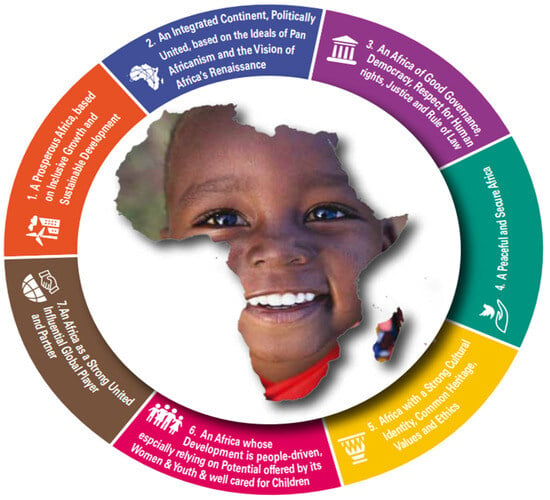
Figure 1.
The seven aspirations of the AA2063. Source: Adopted from African Union Watch (2019).
Despite enduring difficulties, this visionary plan strives for a prosperous, unified, and influential Africa by 2063, placing significant emphasis on inclusive development, effective governance, and the preservation of a robust cultural identity.
The AA2063 underscores the significance of inclusive governance and participatory decision-making processes, empowering African citizens to actively contribute to the continent’s development agenda. It seeks to accelerate the implementation of previous and ongoing continental initiatives aimed at fostering growth and sustainable development. The first aspiration, “A Prosperous Africa Based on Inclusive Growth and Sustainable Development”, focuses on eradicating poverty and promoting sustainable development by driving economic transformation through industrialization, value addition, and the development of human and social capital. The second aspiration, “An Integrated Continent, Politically United and Based on the Ideals of Pan-Africanism and the Vision of Africa’s Renaissance”, envisions a politically united Africa with seamless borders, promoting intra-African trade, investment, and the free movement of people.
The third aspiration, “An Africa of Good Governance, Democracy, Respect for Human Rights, Justice, and the Rule of Law”, is committed to upholding democratic values, human rights, and the rule of law through transparent and accountable governance that ensures citizen participation in decision-making processes. The fourth aspiration, “A Peaceful and Secure Africa”, aims to eliminate all wars, conflicts, and gender-based violence, fostering a continent where peace, security, and stability are guaranteed. The fifth aspiration, “An Africa with a Strong Cultural Identity, Common Heritage, Values, and Ethics”, emphasizes the revival and promotion of African cultural identity, values, and heritage, celebrating the continent’s rich cultural diversity.
The sixth aspiration, “An Africa Whose Development is People-Driven, relying on the Potential Offered by African People, especially its Women and Youth, and Caring for Children”, seeks to harness the potential of Africa’s people, particularly women and youth, driving development through inclusive participation and empowerment. Finally, the seventh aspiration, “Africa as a Strong, United, Resilient, and Influential Global Player and Partner”, envisions Africa as a significant and resilient global actor, united in its approach to international relations and contributing meaningfully to global peace and prosperity. Together, these aspirations aim to transform Africa into a global powerhouse, fostering sustainable development, peace, and prosperity for all its citizens.
This study focuses on the third aspiration specifically, examining the progress and challenges related to achieving democracy, good governance, and the rule of law across the continent.
2.2. Empirical Review of the AA2063
Scholars have examined the AA2063, revealing both its progress and challenges. DeGhetto et al. (2016) underscore Africa’s dual narrative of advancements alongside persistent difficulties, emphasizing the necessity of overcoming obstacles to fulfill AA2063’s aspirations. Building on this, Ufomba (2020) questions Africa’s development trajectory despite its abundant resources, highlighting the urgency for AA2063’s strategies to alleviate poverty and foster sustainable growth. Ogbonnaya (2016) delves into the interplay between terrorism and development challenges, stressing the imperative of security and stability in advancing AA2063’s objectives. This suggests that addressing security concerns is pivotal for progress, a notion echoed by Nhamo (2017) and Garfias Royo et al. (2022), who emphasize the alignment of Sustainable Development Goals with AA2063. They assert Africa’s role in shaping its developmental priorities to combat poverty effectively.
Opeyeoluwa and Fatokun (2022) discuss AA2063’s role in driving Africa’s economic resurgence, emphasizing the Agenda’s focus on economic priorities and strategies for sustainable development and industrialization. This aligns with Gowreesunkar’s (2019) emphasis on the need for African tourism to align with AA2063’s objectives, suggesting that tourism development should contribute to the Agenda’s economic and social goals.
Despite the widespread literature on Africa’s democratic transformations, significant gaps remain in understanding the current state of democratization and its future trajectory. It is particularly unclear whether Africa can achieve Aspiration 3 of AA2063, which envisions “an Africa of good governance, democracy, respect for human rights, justice, and the rule of law”, within the specified timeframe, given current trends or if adjustments in momentum and strategy are required. While scholars like Nwebo (2018) have highlighted the importance of democratic governance in the context of AA2063, the study remains too general, failing to examine specific dimensions of democracy, such as liberal, electoral, and participatory aspects. It also does not assess the effectiveness of these dimensions or how far Africa has progressed toward achieving the ten-year expected outcomes of AA2063. This lack of specificity and detailed analysis leaves a gap in understanding the nuances of democratic governance in the African context. This study addresses these gaps. The analysis not only contributes to the existing literature but also underscores the need for a nuanced approach to understanding and implementing the democratic aspirations of AA2063.
3. Materials and Methods
This study employs a mixed methods approach to examine African democracy within the framework of Agenda 2063. It combines public perceptions from households with expert insights, tracking democratic governance trends over the past decade and focusing on electoral, liberal, and participatory dimensions. It also assesses country-level performance to validate the quantitative findings.
3.1. Research Design
This study employs a quantitative design complemented by qualitative case studies to conduct an in-depth analysis of the progress and challenges of African democracy in the context of Agenda 2063. To address the research questions, the article employs both a bottom-up approach and a top-down approach. The bottom-up approach entails capturing the perceptions and insights of households regarding their respective governments’ performance in ensuring democratic governance. On the other hand, the top-down approach involves gathering insights from local and cross-national experts concerning various indicators of democracy.
3.2. Source and Nature of Data
This study relies on three distinct datasets: Varieties of Democracy (V-Dem), the Ibrahim Index of African Governance (IIAG), and Afrobarometer (Afro). Each dataset contributes unique qualities.
The first dataset, the V-Dem dataset, is a wide-ranging collection project involving over 3700 local and cross-national experts who code democracy indicators based on existing data sources (Coppedge et al. 2023b). Recognized globally as one of the largest social science data initiatives, V-Dem provides reliable information on detailed democracy components, including elections, judicial independence, and direct democracy. It spans from 1900 to 2023, with over 400 indicators scored between 0 and 1, indicating the degree of democracy relevance for each specific index.
The second dataset, the IIAG dataset, assesses democratic governance at continental, regional, and national levels, offering specific scores and trends across various governance dimensions (Mo Ibrahim Foundation 2022). Conducting biannual evaluations for 54 African countries, the IIAG consolidates diverse data into composite governance scores, standardized to a range of 0–100 for comparison. The 2022 IIAG provides comparable data from 2012 to 2021, enabling the analysis of governance trends for a decade.
The third dataset, the Afro dataset, based on public perception, comprises nationally representative surveys conducted regularly in over 30 African countries, focusing on household perspectives on democracy, elections, government, the economy, and society (Afrobarometer 2022). Drawing from Rounds 6, 7, and 8 conducted in 2011, 2016, 2019, and 2022, this dataset illuminates trends and dynamics in African democratic governance.
Integrating these datasets strengthens our methodological approach by leveraging their unique strengths and compensating for the weaknesses of one with another. This integration allows for cross-verification, addresses biases, and provides a holistic understanding of democratic processes, public opinions, and governance dynamics.
3.3. Data Analysis
The Afro dataset represents the bottom-up approach, while the V-Dem and IIAG datasets represent the top-down approach. These datasets cover a 10-year period, enabling the identification of patterns and trends in democratic transformation in Africa during this time. To address our research questions, we employed various analysis techniques, including data visualization, cohort analysis, comparative analysis, and descriptive statistics.
Initially, we utilized visual representations, such as line graphs, radar charts, and bar charts, to analyze trends and patterns. Following this, cohort analysis was employed to group data into cohorts and study how these groups evolve over time. Comparative analysis was then used to compare patterns and trends in democratic transformation throughout the ten-year period. Finally, descriptive statistics were employed to examine the rate of change in trends in democratic transformation and estimate the momentum required for Africa to achieve the goals of AA2063, using the current ten-year pace as a reference.
Based on the 10-year expected outcome of Aspiration 3 of the AA2063, the analysis was conducted at the continental level. In addition, despite the existence of five dimensions of democracy—electoral, liberal, participatory, deliberative, and egalitarian democracy in the V-Dem dataset—our analysis focused on the first three for two reasons: to align with the other datasets and because it was based on Aspiration 3 of the AA2063’s first ten-year expected outcome, which primarily incorporates the first three dimensions. We also triangulated it with country-level analysis to illustrate which countries are performing well and which are facing serious issues contributing to the current status of African democracy. Subsequently, we delve deeper into why these discrepancies exist, offering detailed suggestions on what Africa and African leaders can do to improve results over the next decade.
4. Results
This section is structured into three distinct subsections. The initial subsection presents the trends and patterns of the three dimensions of democracy, “electoral, liberal, and participatory democracy”, observed in Africa over the past decade. The subsequent subsection examines the overarching trends evident in democracy. The third subsection specifically centers on the changing dynamics of democracy in Africa, exploring the rate of change using indices and percentage metrics.
4.1. Decade in Review: Challenges and Success Factors of Africa’s Democratic Governance
4.1.1. Electoral Democracy
The V-Dem and IIAG systems of measurement rate the fundamental aspect of attaining electoral democracy, encompassing citizens’ rights to exercise their political rights through competitive and regular elections without fraud or systematic irregularities. This assessment also considers the freedom of political parties and civil society organizations to operate without constraints, along with the method the chief executive is chosen, whether through direct or indirect elections. In addition, the Afro measures citizens’ perceptions of electoral democracy. Figure 2, Figure 3 and Figure 4 depict the trends and patterns in Africa’s electoral democracy, representing its electoral democracy components.
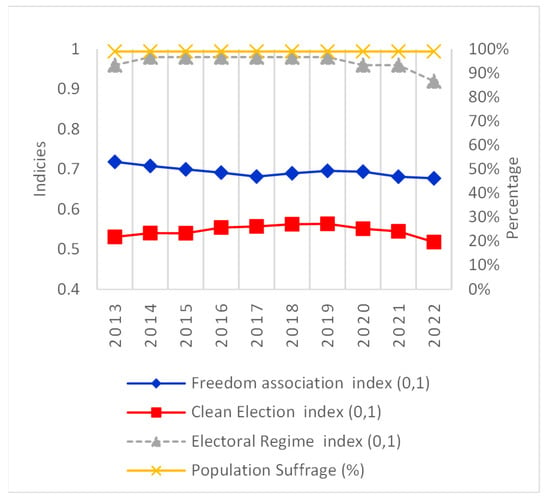
Figure 2.
Electoral democracy index in Africa. Source: V-Dem (2013–2022).
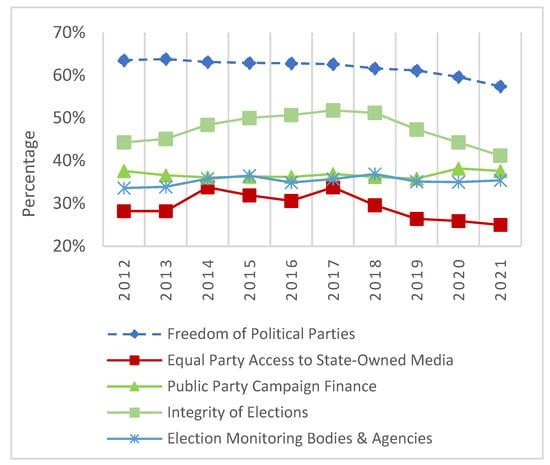
Figure 3.
Electoral democracy in Africa. Source: IIAG (2012–2021).
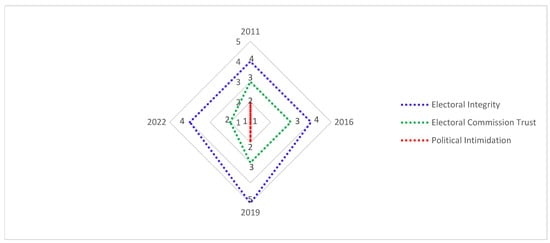
Figure 4.
Perceived electoral democracy distribution in ratios. Source: Afro (2011–2022).
Freedom of association under the V-Dem assesses whether political parties, including opposition parties, have the right to form and engage in elections, as well as the freedom for civil society organizations to establish and operate without restrictions. It reveals a consistent decline in freedom of association in Africa (illustrated in Figure 2). Shifting to the clean election index measured by V-Dem evaluates the extent to which elections are free and fair, encompassing factors like the “absence of registration fraud, systematic irregularities, government intimidation of the opposition, vote buying, and election violence” (Coppedge et al. 2023a). Statistically, there was slight progress in the trends of clean election from 2013–2018, then a continuous decline has been observed with the lowest score in 2022. Turning to Figure 3 of the IIAG data, freedom of political parties has exhibited a continuous declining trend compared to 2012, while party campaign financing has shown slight improvement. In addition, accessibility to state owned media to opposition political parties is below 40% and has shown a declining trend from 2018–2021 (see Figure 3).
The electoral regime index in Figure 2 indicates the presence of regularly scheduled national elections in accordance with election laws, with only a slight decline in 2022. The trends in popular suffrage are also encouraging in the African context. However, according to the data from IIAG, the integrity of elections has shown a declining trend from 2019 to 2021. Moreover, the independence and operating capacity of election monitoring bodies and agencies remain stagnant, with the highest score reaching only 37%. This is a concerning component as the independence and operating capacity of these bodies significantly impact election outcomes.
Examining the electoral democracy ratios in Figure 4 of Afro data, public trust in the national electoral commission has declined from three out of ten voters to two out of ten voters in 2022. Similarly, public perception in freeness and fairness of national elections has decreased from five out of ten voters in 2019 to four out of ten voters in 2022. This trend is also evident in political intimidation, with two out of ten voters experiencing this intimidation across the study period.
4.1.2. Liberal Democracy
The liberal dimension of democracy encompasses the fundamental principle of safeguarding the rights of individuals and minorities to prevent potential state and majority tyranny (Coppedge et al. 2023b). This is achieved through the principle of equality before the law, strong rule of law, and effective checks and balances (distribution of power throughout a political system) implemented by the judiciary and legislature, limiting executive power. These aspects are captured by the three indices of V-Dem and four variables of the IIAG. Afro is also used to measure citizens’ perception of the frequency of unequal treatment by their government. Figure 5, Figure 6 and Figure 7 illustrate the trends of these factors over time in Africa.
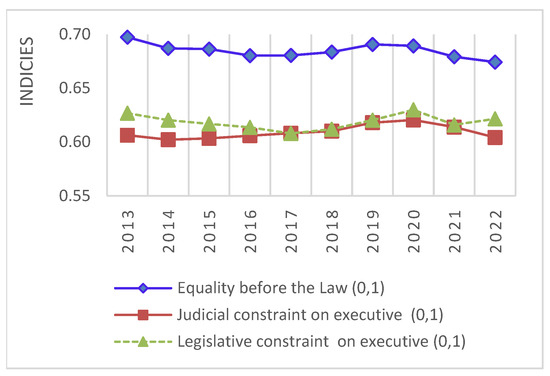
Figure 5.
Liberal democracy component index. Source: V-Dem (2013–2022).
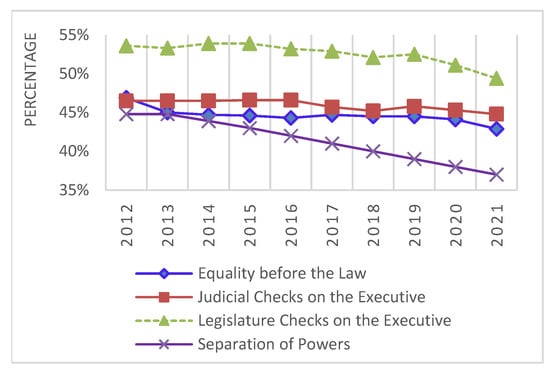
Figure 6.
Percentage of Liberal democracy. Source: IIAG (2012–2021).
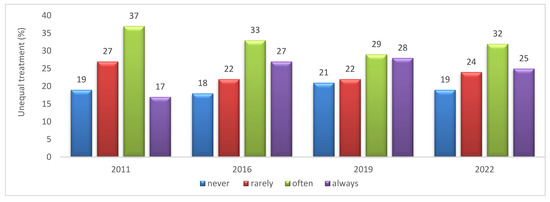
Figure 7.
Frequency of unequal treatment. Source: Afro (2011–2022).
In the domain of institutional checks and balances, V-Dem reveals no improvement in the last decade for either the judicial constraint or the legislative constraint on the executive; instead, it fluctuated between 0.63 and 0.60. Similarly, IIAG shows a low level of checks and balances, with the situation being worse in judicial constraint compared to legislative constraint on the executive. The most alarming concern within this dimension is the continuous decline in the separation of power among government organs, clearly observed from 45% in 2012 to 37% in 2022 (see Figure 6).
Figure 5 illustrates a comparatively higher score for equality before the law than for judicial and executive constraints on the executive. The trends for equality before the law and individual liberty have fluctuated between 0.7 and 0.68, with a slight decrease to 0.67 in 2022. Despite aligning with the findings from V-Dem, the results from IIAG indicate that the highest recorded percentage, experienced in 2019, was 47%, declining to 43% in 2022. In Figure 7, Afro data reveals a consistent perception of unequal treatment by the government, with 27% in 2016, 28% in 2019, and 25% in 2022. In terms of ratio, two out of ten respondents believe they have never been treated unequally. This implies that eight out of ten people perceive unequal treatment by their government, irrespective of its frequency.
4.1.3. Participatory Democracy
The participatory aspect of democracy emphasizes citizens’ active engagement in political decision-making, whether through direct or indirect means, as well as non-electoral political participation facilitated by civil society organizations (Mechkova and Lindberg 2016).
According to V-Dem data in Figure 8, the civil society participation index consistently scores the highest, indicating a significant increase in Africans’ involvement in civil society organizations over the analyzed period. However, IIAG data shows a persistent decline in civil society space in Africa, despite having the highest percentage compared to the extent to which citizens can associate and assemble freely (see Figure 9). Civil society space assesses the freedom of civil society and non-governmental organizations (NGOs) to establish and operate without facing repression or persecution. While citizens actively participate in civil society, the space for these organizations to operate freely and contribute to democratic processes is facing constraints over time.
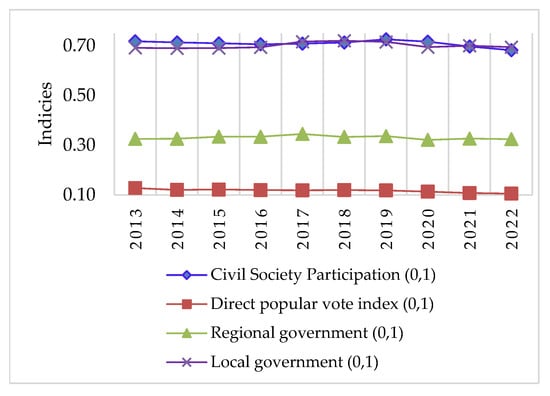
Figure 8.
Participatory democracy index. Source: V-Dem (2013–2022).
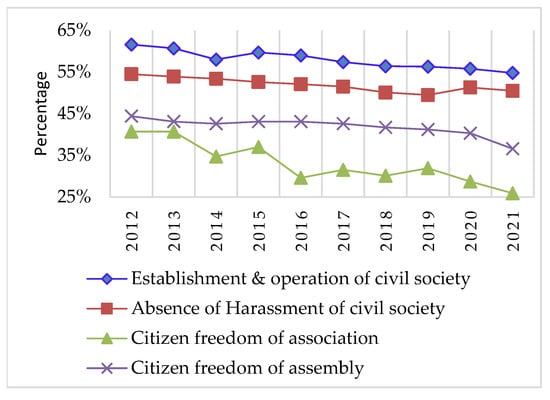
Figure 9.
Percentage of participatory democracy. Source: IIAG (2012–2021).
Figure 8 also indicates a substantial increase in people’s involvement in the political decision-making of their country, especially in local government. Citizens’ active involvement in local government reflects the presence of elected local governments, decentralized political party nominations, and their operational independence from unelected bodies at the local level (Coppedge et al. 2023a). The lack of citizens’ participation in regional government, as illustrated in Figure 8, is evident and arises from the non-existence of elected regional governments, substantial interference from unelected bodies, or a combination of both factors. This is corroborated by IIAG findings (illustrated in Figure 9), indicating a continuous and substantial decline in citizens’ freedom to associate and assemble freely. Freedom of association alone has reduced from 43% in 2013 to 31% in 2022. The decline in citizens’ freedom of association and assembly, along with the low level of citizens’ participation in regional government, narrows the democratic space, restricting the diversity of political voices and limiting citizens’ active participation in governance.
Examining citizens’ satisfaction with democracy in Figure 10 using Afro data reveals an increasing trend in the percentage of respondents who are “not at all satisfied”, rising from 17% in 2011 to 20% in 2016, and further to 24% in 2022. Additionally, those expressing they are “not very satisfied” increased from 29% in 2011, 2016, and 2019 to 30% in 2022 regarding democratic institutions and democratization. In contrast, the percentage of respondents who are “fairly satisfied” with democracy exhibits a declining trend, decreasing from 35% in 2011 and 2016 to 32% in 2019 and further to 31% in 2022. A similar declining trend is observed for those “fully satisfied.” The increasing trend in dissatisfaction with democratic institutions and democratization, coupled with a decreasing trend in satisfaction, underscores growing concern about the state of democracy among the surveyed population.
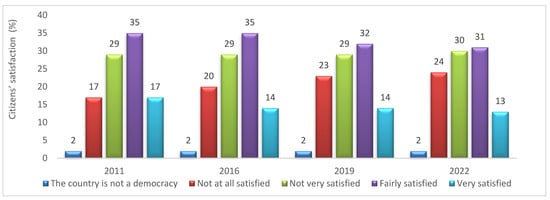
Figure 10.
Level of citizens’ satisfaction of democracy. Source: Afro (2011–2022).
4.2. Reflecting on the Overall Democratic Performance
In 2013, as illustrated in Figure 11, Africa’s democratic performance, measured by V-Dem, featured scores of 0.55, 0.43, and 0.37 in electoral democracy, liberal democracy, and participatory democracy indices, respectively1. However, these initial scores have not remained stable, with an apparent decline observed across all three democratic indices, particularly after 2019. The deterioration of democratic performance is further confirmed by data from the IIAG, indicating a parallel trend.
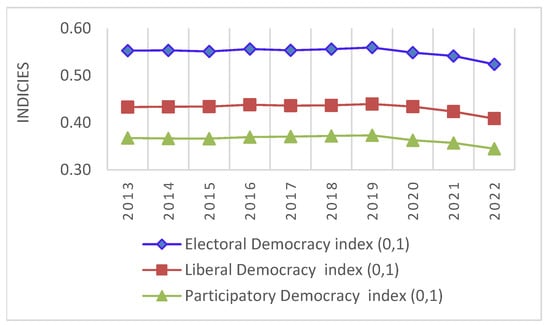
Figure 11.
V-Dem democratic indices. Source: V-Dem (2013–2022).
In 2013, as shown in Figure 12, the percentages for electoral democracy, liberal democracy, and participatory democracy were 41%, 48%, and 49%, respectively, with a subsequent decrease in these percentages to 39%, 44%, and 40% in 2022.
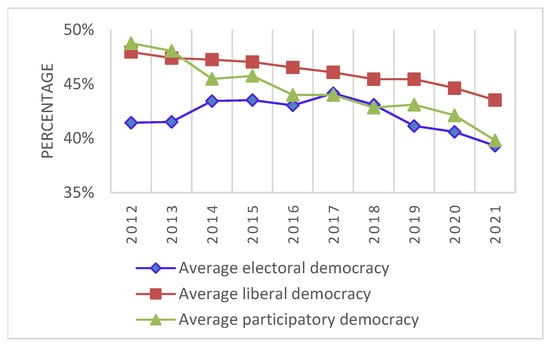
Figure 12.
IIAG average (AV) democracy. Source: IIAG (2012–2021).
When comparing the three democratic indices, it becomes evident that the participatory democracy index notably diverges from the midpoint (0.5) of the scale, with the liberal democracy index following closely behind. This difference indicates a challenge in achieving active citizen participation in the political decision-making process at the regional/provincial level. Moreover, the position of the liberal democracy index, although not as markedly distant, still suggests a notable challenge in realizing equality before the law and the separation of powers. Africa has seen a remarkable decrease in average electoral democracy after 2017 followed by participatory democracy, as depicted in Figure 12 of the IIAG data.
The data on the demand and supply of democracy, primarily measured through public perception of democratic reforms in respective countries, highlight a significant and concerning trend in the declining supply of democracy, as shown in Figure 13, Figure 14 and Figure 15 of the Afrobarometer data. Demand for democracy is assessed using an additive index based on four democratic commitments, categorizing individuals into groups ranging from no demand to full demand based on their agreement with democratic values. Conversely, the supply of democracy is measured using an index based on satisfaction with democratic performance, distinguishing between those who perceive no supply, partial supply, or full supply of democracy. The data reveal a continuous increase in the perception of no supply of democracy, rising from 37% in 2011 to 39% in 2019 and further to 40% in 2022, while the “no demand for democracy” never exceeds 4% over the past decade.
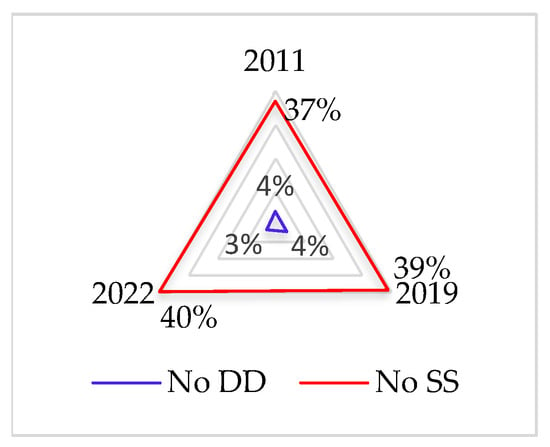
Figure 13.
No demand (DD) and supply (SS) of democracy. Source: Afro (2011–2022).
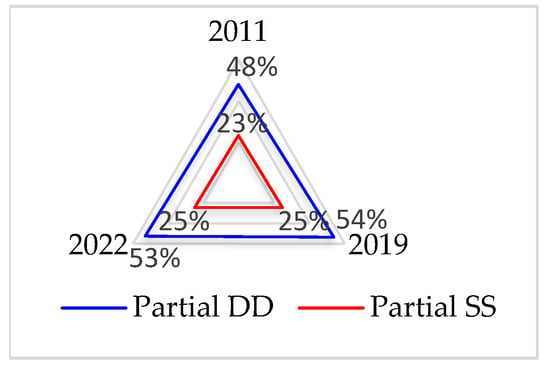
Figure 14.
Partial demand (DD) and supply (SS) of democracy. Source: Afro (2011–2022).
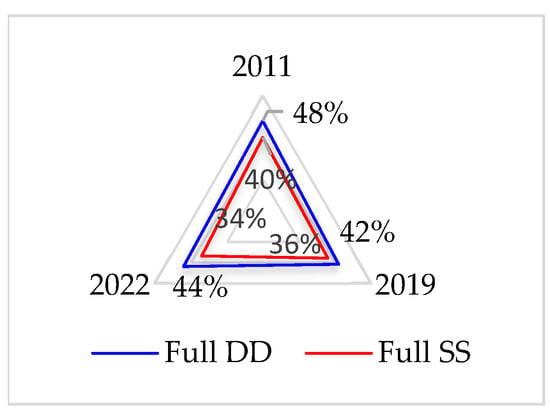
Figure 15.
Full demand (DD) and supply (SS) of democracy. Source: Afro (2011–2022).
This trend signifies a concerning incongruity between the perceived demand and supply of democracy, with the weight and trajectory of the no-supply trend far surpassing that of the no-demand trend. For instance, in 2022, while the perception of no demand for democracy was merely 4%, the perception of no supply surged to 40%, creating a substantial 1:10 ratio of no demand to no supply, respectively. Analyzing the other end of the spectrum reveals an additional worrying trend concerning full demand and full supply of democracy. The decline in full demand for democracy, dropping from 48% in 2011 to 42% in 2019, followed by a slight increase to 44% in 2022, indicates a fluctuating yet somewhat resilient endorsement of democratic principles by the public. In contrast, the trajectory of full supply of democracy paints a more concerning picture, experiencing a decline from 40% in 2011 to 36% in 2019 and a further reduction to 34% in 2022.
4.3. Changing Dynamics of Democratic Performance in Africa
This section examines whether Africa is progressing or regressing towards the outlined democratic aspirations and estimates the momentum required to realize the objectives set forth in AA2063 if the current pace proves insufficient, using the rate of change in dynamics of democratic performance.
Table 1 highlights the unweighted average of democracy and determines which of its dimensions have a more pronounced impact on the overall dynamics of democracy in Africa. Overall, the unweighted average of democracy trends using V-Dem is 0.45 (45%), and using IIAG, it is 0.44 (44%). Neither the unweighted average nor the individual dimension of democracy in both data sources extend to reach scores around the middle of the scale in both datasets, apart from the EDI, which surpasses the 0.5 (50%) threshold.

Table 1.
Rate of change trends in overall democracy in Africa, 2012/3 2021/2.
In addition, the average rate of change for democracy shows a declining trend over the past decade. For example, using the V-Dem indices in column 8 of Table 1, the unweighted average of the democratic index remained constant at 0.45 (45%) from 2013 to 2018 while it increased to 0.46 (46%) in 2019 and started to decline to 0.45 (45%) in 2020, to 0.44 (44%) in 2021, and further reduced to 0.43 (43%). Among the dimensions of democracy, PDI and EDI have the lowest unweighted average change, −0.92% each, followed by LDI (−0.61%), which negatively contributed to the overall V-Dem rate of reduction across the study period.
Using the IIAG estimates in column 16 of Table 1, the average weighted percentage of democracy in 2013 and 2014 was 0.46 (46%), while it reduced to and remained constant at 0.45 (45%) in 2015, 2016, 2017, and 2018. Furthermore, it decreased to 0.44 (45%) in 2019 and continuously reduced to 0.41 (41%) in 2022. Among the dimensions of democracy, despite the average of ED being the lowest compared to PD and LD, PD has the lowest unweighted average changes, −2.2%, followed by LD (−0.95%), which contributed to the overall IIAG rate of reduction across the study period. This is because looking at the reference period, 2013, PD has the highest score followed by LD, compared to PD.
The mean of unweighted average change in African democracy, as measured by both IIAG and V-Dem, shows deterioration, with mean average changes of −1.22% and −0.68%, respectively. This finding represents a significant setback in achieving the goals outlined in Agenda 2063 and suggests that efforts toward achieving democracy and good governance need to be reevaluated.
As depicted in Table 2, the percentage change (gap) in the perception of the absence of the supply of democracy exceeds “the absence of demand for democracy”, with this gap consistently increasing over the study years. This raises two primary concerns: first, the gap is substantial (ranging from 33% to 37%) where individuals perceive there is no supply of democracy, and second, the gap is widening by an additional 2%. On the opposite angle, when examining full demand and supply, the demand for full democracy consistently surpasses the supply, albeit with a narrow gap, reaching a maximum of 10% in 2022. The declining trend, however, implies not only a decline in the supply of democracy but also a diminishing demand for it, signaling a loss of hope in their governments’ ability to enact democratic reforms in their respective countries. Supporting this argument, Afrobarometer CEO Joseph Asunka highlighted at the Africa Drive for Democracy Conference Elders Retreat, held from 17–21 July 2023 in Arusha, Tanzania, that this decline not only reflects a reduction in the supply of democracy but also indicates a diminishing demand for it (Afrobarometer 2023). This dual decline signals a broader loss of hope in governments’ ability to implement effective democratic reforms, illustrating the deepening crisis of confidence among citizens regarding their political institutions.

Table 2.
Percentage of change trends in the perception of demand and supply of democracy in Africa.
Table 2 also shows that the average change for “no demand for democracy” has decreased by 12.5%, while the average change for “no supply of democracy” has increased by an average of 4%. Examining the average change for partial demand and partial supply, the former has increased by 5.3%, while the latter has increased by 4.35%. Lastly, the average change for full demand has decreased by 3.87%, while the average change for full supply has decreased by 7.78%. The reduction in “no demand for democracy” is a positive sign, indicating a slight increase in demand for democratic principles. However, the simultaneous increase in the “no supply of democracy” raises concerns about the challenges in meeting the perceived demand.
5. Discussion
The discussion focuses on four primary issues. Firstly, it focuses on a comparative analysis of trends in relation to the reference points of 2012 for IIAG data, 2013 for V-Dem data, and 2019 for Afro data, assessing whether the continent is progressing in the intended direction. The selection of reference points is based on the adaptation year of AA2063, data availability, and the nature of the data. Secondly, it discusses why this trend is occurring. Third, the discussion compares the anticipated outcomes of AA2063 after the completion of its first ten years and the actual outcomes achieved, estimating if the AA2063 could be realized if the current trend continues, assuming other factors remain constant. Finally, country-level analysis is conducted to examine their influences, whether positive or negative, to the current state of Africa’s democratic outlook and the reasons behind these discrepancies.
Analyzing democratic indices using 2013 as a reference point reveals no improvement in electoral and liberal democracy indices, along with a concerning 0.5% decline in the participatory index. Examining the trends of democratic performance in Ghana from 1990 to 2010, Mechkova and Lindberg (2016) observed a similar declining trend in participatory democracy, which is also the lowest-scoring dimension. However, they found that the electoral dimension scored the highest, with a score of 0.75, which is 0.20 higher than the aggregate score for Africa in 2022 that we found. The lack of improvement in democratic infrastructure compared to the reference year of 2013 raises significant concerns about the trajectory of democratic development and its potential impact on the objectives outlined in the AA2063.
In our study on perceived indicators of electoral democracy using Afro data, the average trust in the national electoral commission is three out of ten people. Using the same data, the average perception of freeness and fairness in elections is four out of ten people. The observed statistics deviate from the anticipated outcomes of the Agenda, envisioning that at least seven out of ten individuals in each member state of the union perceive elections as free, fair, and credible by 2023 (African Union 2015b). These statistics demonstrate that the continent achieves 42.85% of the ten-year expected outcome in the trust of national electoral commission and 57% in perceptions of freeness and fairness in elections. If the current trend persists, neither the national electoral commission will be trusted, nor will individuals perceive the freeness and fairness of national elections by 2063.
This study investigated the trends of the separation of powers and the effectiveness of checks and balances among governmental branches, with 2012 IIAG data and 2013 V-Dem serving as key reference points. The findings reveal an absence of improvement in checks and balances over the analyzed period. This raises significant concerns about the functionality of established frameworks designed to maintain the separation of powers. The percentage of separation of power reduced from 45% in 2012 (reference point) to 37%, reduced by 8%. These observed statistics deviate from the expected outcomes outlined in AA2063, envisioning that a minimum of 70% of the population will believe they are holding their leaders accountable by 2023 (African Union 2015a). In addition to the substantial declining trend, the continent achieved only half (52.85%) of the ten-year expected outcome. If the ongoing trend persists, Africa faces a scenario of concentration of power, highlighting a critical link between the absence of separation of powers and vulnerability to unconstitutional changes in government. These unconstitutional changes of government have already occurred in 12 African countries over the past ten years.2
The study identified an increase in the perception of individuals who feel consistently treated unequally by their government, rising from 17% to 25%. In terms of ratio, the data suggests that eight out of ten people feel unequally treated by their government, expressing this sentiment either rarely, often, or always in 2022. In other words, only two out of ten people perceive that they are treated equally. This finding deviates from the expected outcomes of AA2063, envisioning that at least 70% of the population will believe they are empowered by 2023 (African Union 2015a). In other words, the continent achieved a quarter (25%) of the ten-year expected outcome. This prevailing perception may contribute to increased public dissatisfaction and diminished trust in government institutions, which in turn poses challenges to social cohesion and political stability.
The study found that the ratio between the perception of no demand for democracy and the perception of no supply of democracy is one to ten. This ratio deviates from the expected outcomes of AA2063, envisioning that at least 70% of the population will believe in the existence of democracy and democratic institutions by 2023 (African Union 2015a). This means that the continent has achieved only 14.29% of its ten-year envisioned goal. The higher percentage of people perceiving no supply compared to no demand suggests that, while there may be a willingness or desire for democratic governance (“demand”), the actual fulfillment of this demand through effective democratic institutions and processes (“supply”) is lacking or perceived to be lacking. This imbalance raises concerns about the effectiveness and responsiveness of democratic institutions in meeting the expectations and aspirations of the public, potentially leading to dissatisfaction, erosion of trust in democratic processes, and challenges to the stability of democratic governance. Addressing this gap between demand and supply is crucial for fostering a robust and responsive democratic system.
The main findings of the study reveal that Africa achieved 64% (45/70*100) of the ten-year expected outcome (70%) for democratic governance, calculated from the average performance of 45% using V-Dem indices. In addition, Africa achieved 62% (44/70*100) of the ten-year expected outcome (70%) for democratic governance, calculated from the average performance of 44% using IIAG percentage. However, when calculated out of 100%, the findings show 45% using V-Dem indices and 44% using IIAG percentage. The observed momentum suggests that, at the current rate, the continent is unlikely to achieve the ambitious democratic aspirations by 2063. To bridge this disparity and realize the Agenda’s democratic vision, Africa needs to surpass its current performance by more than double each year.
Several factors account for the observed democratic deficit, one of which is the emergence of the pandemic. The global crisis triggered by the COVID-19 pandemic has adversely impacted democracy worldwide. According to Repucci and Slipowitz (2020) democracy is facing challenges globally, yet the public’s desire for it remains unabated. In the wake of the coronavirus outbreak, the state of democracy and human rights has deteriorated in 80 countries. Governments, in response, have resorted to abuses of power, suppressing dissent, and undermining crucial institutions, thereby compromising the democratic framework. In addition, the pandemic disrupted democracy, and the electoral process across many African countries3 (Slim 2020).
Persistent political instability and conflicts in many African countries have been formidable obstacles to the positive trajectory of democracy on the continent. The prevalence of prolonged political unrest, civil strife, and armed conflicts has not only disrupted the democratic processes but has also posted significant challenges to the establishment and sustenance of stable democratic institutions. The AU envisions a zero tolerance for unconstitutional changes in government (UCG) (van der Wilt 2019; Nyinevi and Fosu 2023). This ambitious target underscores the importance of electoral democracy. However, the reality contradicts this vision. Between 2013, when AA2063 was adopted, and 2022, there have been 12 instances of unconstitutional changes of government in various African countries, including coups, military interventions, and non-coup UCG, with six occurring after 20204 (Nyinevi and Fosu 2023). Despite the AU’s robust norms, sanctions, and institutions against UCG, there is inconsistency in applying these measures to various forms of UCG, even in clear cases of coups and military interventions (Nyinevi and Fosu 2023). This not only disrupts electoral democracy but also raises concerns about political instability and challenges in upholding constitutional principles, underscoring the critical role of effective separation of powers in preventing such scenarios.
The observed decline in democracy, as highlighted in this study, not only poses challenges to achieving the ambitious democratic goals set for AA2063 but also raises concerns about the potential resurgence of authoritarian rule. In line with this trend, Stokke (2018) argues that although democracy is widely accepted as the ideal and most common form of government, there are increasing worries about its decline and crisis. In recent years, some countries have moved from democratic systems back to authoritarian rule. According to Cheeseman (2019), under President Yoweri Museveni, Uganda has seen increased repression and a decline in democratic freedoms, with crackdowns on opposition and media. Mozambique faces similar issues, including electoral fraud and suppression of political opposition, earning it the label of a “moderate autocracy.” In Burundi, President Pierre Nkurunziza and his successor have overseen significant democratic backsliding, with accusations of human rights abuses and political repression. Despite hopes for reform following Robert Mugabe’s ousting, Zimbabwe continues to grapple with authoritarian practices under President Emmerson Mnangagwa, facing criticism for electoral irregularities and human rights violations. Tanzania has also experienced a decline in democratic freedoms under President John Magufuli and his successor, marked by restricted media and harassment of opposition leaders.
The main concern regarding democratic backsliding is that as democracy weakens, autocratic leaders may exploit social unrest to undermine democratic values and consolidate more power. Following an examination of Africa’s continental-level democratic situation, we analyze which countries contribute positively or negatively to its democratic landscape and the reasons behind these discrepancies. As highlighted by the Mo Ibrahim Foundation (2022), Tunisia, Cabo Verde, and South Africa emerge as frontrunners in maintaining democratic elections, while Eritrea, South Sudan, and Equatorial Guinea lag behind, indicating substantial deficiencies. For instance, Tunisia underwent a successful democratic transition following the Arab Spring, paving the way for competitive elections and a pluralistic political landscape (Sahide et al. 2022). Cabo Verde has upheld stability through democratic governance, nurturing political inclusivity and consensus-building, positioning good governance as one of its most marketable assets (Baker 2009) and garnering contentment with both the political system overall and the electoral system (Hounkpe and Fall 2012). Despite challenges, South Africa’s public participation in periodic elections within a multiparty political system offers hope for advancing democratic ideals (Fagbadebo and Ile 2023).
In contrast, countries like Eritrea, Equatorial Guinea, and Swaziland (now Eswatini) exemplify the negative trend. In each case, the lack of democratic processes poses a significant threat to democracy, undermining accountability, transparency, and citizen participation. According to the V-Dem data, the erosion of key liberal democratic values—such as the rule of law, separation of powers, protection of civil liberties, free and fair elections, accountability and transparency, and pluralism and political participation—in countries like Sudan, Somalia, Libya, and Eritrea has led to socio-economic challenges, including poverty, conflict, and displacement (Coppedge et al. 2023b; Repucci and Slipowitz 2022).
Countries like Cabo Verde, Sao Tome and Principe, Seychelles, and Benin have consistently demonstrated resilience and progress in upholding liberal democratic principles, maintaining strong institutions, upholding the rule of law, and fostering political stability (Mo Ibrahim Foundation 2022; Freedom House 2022, 2023c). On the other hand, Sudan, Somalia, Libya, and Eritrea represent a stark contrast (Mo Ibrahim Foundation 2022). These nations have grappled with political instability, authoritarian rule, and human rights abuses, leading to socio-economic challenges. Regarding participatory democracy, Namibia, Ghana, and Cabo Verde provide civil society space due to their commitment to democratic principles and respect for human rights (Mo Ibrahim Foundation 2022). Conversely, countries like Eritrea, Equatorial Guinea, and Burundi exhibit narrow civil society space due to authoritarian governance and repression of dissent (Mo Ibrahim Foundation 2022). This stifling undermines democratic governance, restricts participation, and perpetuates fear and distrust. A similar trend is observed in freedom of association and assembly, with Mauritius, Botswana, and Cabo Verde leading in protection, while Eritrea, Equatorial Guinea, and Djibouti violate these freedoms (Freedom House 2021, 2023a, 2023b; Mo Ibrahim Foundation 2022; Africa Center for Strategic Studies 2024).
6. Conclusions and Policy Implications
The disparity between the promises made by the member states AU and their subsequent actions in their respective countries is wide. This study has scrutinized the trends in the democratic landscape against the objectives set forth in AA2063. The observed decline in trust in national electoral commissions, perceptions of election fairness, and the absence of improvement in checks and balances are detrimental to the democratic principles outlined in Aspiration 3. These challenges raise concerns about the ability to achieve the Agenda’s goal of ensuring free, fair, and credible elections, as well as holding leaders accountable.
While some countries on the continent have made commendable progress towards democratic governance, many others continue to grapple with entrenched authoritarianism, political instability, and human rights abuses. The instances of unconstitutional changes in government further jeopardize the democratic stability, highlighting the critical need for effective separation of powers. The perceptions of unequal treatment and a gap between the demand and supply of democracy also signal potential obstacles in realizing the principles of justice and respect for human rights.
The overarching trends, marked by scores below mid-scale, underscore a clear need for improvement in democratic performance across the region. This imperative is further accentuated by the observed declining trend in the average rate of change for democracy over the past decade. This decline hints at the intricate and multifaceted nature of the democratic environment, posing challenges to sustained progress. To realize the democratic aspects of AA2063, African countries need to score more than double their current performance. Specifically, governments should:
- Implement comprehensive reforms to strengthen and enhance checks and balances within governmental structures. The lack of checks and balances is identified as a major contributor to the low rate of reduction in V-Dem scores. Strengthening these mechanisms is essential to fortify democratic governance, ensuring accountability and preventing abuses of power.
- Introduce initiatives to increase citizens’ direct participation in the democratic process, facilitating a more direct role in decision-making. The low level of citizens’ direct popular vote has been identified as a significant factor contributing to the low rate of reduction in V-Dem. Empowering citizens with a more direct voice enhances the democratic process and fosters a sense of ownership and representation.
- Develop and implement policies to actively promote citizens’ engagement at the regional or provincial level. The observed low level of citizens’ engagement at the regional or provincial level is a key contributor to the low rate of reduction in V-Dem. Fostering regional and provincial participation enhances local representation and strengthens the overall democratic framework.
- Strengthen legal frameworks to ensure a clear separation of powers among different branches of government. The lack of separation of power contributes significantly to the low rate of reduction in IIAG percentage. Reinforcing this separation is vital for maintaining a balanced and effective democratic system.
- Revise and implement policies to protect and promote citizens’ rights to freedom of association and assembly. The restricted freedom of association and assembly is a critical factor contributing to the low rate of reduction in IIAG percentage. Safeguarding these fundamental rights is essential for a thriving democratic society.
- Implement measures to ensure fair and equal access to state-owned media for all political entities. Unequal access to state-owned media is identified as a significant contributor to the low rate of reduction in IIAG percentage. Ensuring fair access fosters an informed electorate and promotes a level playing field in democratic processes.
- Strengthen the independence of election monitoring bodies by ensuring clear mandates and sufficient resources. The lack of independence in election monitoring bodies and agencies is a crucial factor contributing to the low rate of reduction in IIAG percentage. Fostering independence in these entities is essential for ensuring the integrity and credibility of electoral processes.
- Strive to bridge the gap between the perceived demand for democracy and its effective supply through responsive democratic institutions. The one to ten ratio between the perceived demand and supply for democracy indicates a potential disconnection between public aspirations for democracy and the perceived performance of institutions, necessitating targeted reforms.
- Finally, governments and regional bodies should establish mechanisms for regular monitoring of democratic infrastructure and adapt policies accordingly. Given the dynamic nature of democratic development, continuous monitoring and adaptive policymaking are essential to address emerging challenges and capitalize on opportunities.
7. Limitations of the Study
The analysis of this study is limited to three dimensions of democracy—electoral, liberal, and participatory—despite the availability of additional dimensions in the V-Dem dataset. This focus was chosen to align with reflect the emphasis of AA2063’s first ten-year expected outcome and other datasets. However, this may overlook important nuances in democratic dynamics. Moreover, the detailed continental-level analysis, with less emphasis on country-level analysis, may mask variations and specific challenges within countries. Future studies should broaden the analysis to encompass all dimensions of democracy provided by datasets like V-Dem, allowing for a more nuanced understanding of democratic dynamics in Africa. In addition, balancing continental-level analysis with more in-depth country-level examinations may uncover unique challenges and opportunities within individual nations.
Author Contributions
Conceptualization, H.G.G.; methodology, H.G.G.; software, H.G.G.; validation, H.G.G. and E.E.; formal analysis, H.G.G.; investigation, H.G.G.; resources, H.G.G.; data curation, H.G.G.; writing—original draft preparation, H.G.G.; writing—review and editing, H.G.G. and E.E.; visualization, H.G.G.; supervision, E.E.; project administration, H.G.G. All authors have read and agreed to the published version of the manuscript.
Funding
This research received no external funding. The APC was funded by Western Norway University of Applied Sciences.
Institutional Review Board Statement
Not applicable.
Informed Consent Statement
Not applicable.
Data Availability Statement
The following datasets have been used for this study and are available at: Afrobarometer dataset (https://www.afrobarometer.org/survey-resource/merged-round-8-data-34-countries-2022/); Ibrahim Index of African Governance dataset (https://iiag.online/data.html?meas=GOVERNANCE&view=map&loc=DZ-AO-BJ-BW-BF-BI-CV-CM-CF-TD-KM-CG-CI-CD-DJ-EG-GQ-ER-SZ-ET-GA-GM-GH-GN-GW-KE-LS-LR-LY-MG-MW-ML-MR-MU-MA-MZ-NA-NE-NG-RW-SN-SC-SL-SO-ZA-SS-SD-ST-TZ-TG-TN-UG-ZM-ZW&subview=score&range1to=2021); and Varieties of Democracy dataset (https://v-dem.net/data/the-v-dem-dataset/).
Acknowledgments
The authors would like to thank the Western Norway University of Applied Sciences for covering the Article Processing Charge (APC) for this study. We want to express our gratitude to the editor, assistant editor, and the anonymous reviewers for their helpful and valuable comments and recommendations.
Conflicts of Interest
The authors declare no conflict of interest.
Notes
| 1 | |
| 2 | According to Nyinevi and Fosu (2023), the Central African Republic, Guinea-Bissau, Mauritania, Madagascar, Niger, Egypt, Zimbabwe, Chad, Mali, Guinea, Sudan, and Burkina Faso have all experienced unconstitutional changes of government over the past decade, reflecting significant disruptions to constitutional order in these countries. |
| 3 | In Africa, 11 nations, including Botswana, Chad, Ethiopia, Gabon, Gambia, Kenya, Liberia, Nigeria, South Africa, Uganda, and Zimbabwe, chose to defer their elections. In contrast, Burundi, Malawi, Benin, Guinea, Cameroon, and Mali conducted their elections as originally scheduled. |
| 4 | Between 2013 and 2022, there have been 12 instances of unconstitutional changes of government (UCG) in different countries. The Central African Republic experienced a coup in March 2003, followed by Guinea Bissau in September 2003 and April 2012. Mauritania faced a UCG in August 2005 and again in August 2008, while Madagascar witnessed such an event in March 2009. Niger went through a UCG in February 2010, followed by Egypt in July 2013 and Zimbabwe in November 2017. Chad faced a UCG in April 2021, and Mali experienced it multiple times in March 2012, August 2020, and May 2021. Guinea saw a UCG in December 2008 and again in September 2021. Sudan faced a UCG in April 2019 and October 2021, and Burkina Faso witnessed it in October 2014, September 2015, and January 2022. In addition, over the same period, there were at least nine instances of non-coup UCG. Countries like Uganda (since 2005), Chad (2018), Burundi (May 2018), Guinea (2020), and Cote d’Ivoire (2020) experienced constitutional manipulations by incumbents to retain power. In contrast, Comoros (2008), Cote d’Ivoire (2010), the Democratic Republic of the Congo (2016), and The Gambia (2016) experienced incumbents’ attempts to cling to power despite electoral defeat or the expiration of their tenure. |
References
- Addison, Tony, Atanu Ghoshray, and Michalis P. Stamatogiannis. 2016. Agricultural commodity price shocks and their effect on growth in sub-Saharan Africa. Journal of Agricultural Economics 67: 47–61. [Google Scholar] [CrossRef]
- Africa Center for Strategic Studies. 2024. Mauritius: November 30. Available online: https://africacenter.org/spotlight/2024-elections/mauritius/# (accessed on 25 March 2024).
- African Union. 2003. Protocol to the African Charter on Human and Peoples’ Rights on the Rights of Women in Africa. Adopted by the 2nd Ordinary Session of the Assembly of the Union, Maputo, Mozambique, 11 July 2003. Available online: https://au.int/en/treaties/protocol-african-charter-human-and-peoples-rights-rights-women-africa (accessed on 6 August 2024).
- African Union. 2007. African Charter on Democracy, Elections and Governance. Adopted by the Eighth Ordinary Session of the Assembly, Addis Ababa, Ethiopia, 30 January 2007. Entered into Force on 15 February 2012. Last Signed on 27 June 2019. Available online: https://au.int/en/treaties/african-charter-democracy-elections-and-governance (accessed on 9 August 2024).
- African Union. 2011. African Charter on Values and Principles of Public Service and Administration. Adopted by the 16th Ordinary Session of the Assembly of Heads of State and Government of the AU, Addis Ababa, Ethiopia, 31 January 2011. Entered into Force on 23 July 2016. Available online: https://au.int/en/treaties/african-charter-values-and-principles-public-service-and-administration (accessed on 7 August 2024).
- African Union. 2015a. Agenda 2063: First Ten-Year Implementation Plan 2014–2023. Tech. Rep. April, AU, Addis Ababa, Ethiopia. Available online: https://au.int/en/agenda2063/ftyip (accessed on 2 November 2023).
- African Union. 2015b. Agenda 2063: The Africa We Want. Tech. Rep. September, African Union Commission, Addis Ababa, Ethiopia. Available online: https://au.int/en/agenda2063/overview (accessed on 2 November 2023).
- African Union Watch. 2019. Agenda 2063. Available online: https://www.au-watch.org/agenda-2063/ (accessed on 5 December 2023).
- Afrobarometer. 2022. Round 9 Survey Manual. Tech. Rep. July, Afrobarometer, Accra. Available online: https://www.afrobarometer.org/surveys-and-methods/ (accessed on 25 August 2023).
- Afrobarometer. 2023. Declining Satisfaction Threatens African Democracy, Afrobarometer CEO Reveals. Accra: News Release. Available online: https://www.afrobarometer.org/articles/declining-satisfaction-threatens-african-democracy-afrobarometer-ceo-reveals/ (accessed on 8 August 2024).
- Amaral, Rafael, Carla Torre, João Rocha, and Bruno Sepodes. 2021. Ebola outbreaks: A stress test of the preparedness of medicines regulatory systems for public health crises. Drug Discovery Today 26: 2608–26. [Google Scholar] [CrossRef] [PubMed]
- Amupanda, Job S. 2018. Who is in the “we”? interrogating the African union’s agenda 2063 and youth political participation. International Journal of African Renaissance Studies—Multi-, Inter and Transdisciplinary 13: 56–76. [Google Scholar] [CrossRef]
- Azomahou, Théophile T., Njuguna Ndung’u, and Mahamady Ouédraogo. 2021. Coping with a dual shock: The economic effects of COVID-19 and oil price crises on African economies. Resources Policy 72: 102093. [Google Scholar] [CrossRef] [PubMed]
- Baker, Bruce. 2009. Cape Verde: Marketing Good Governance. Africa Spectrum 44: 135–147. [Google Scholar] [CrossRef]
- Bjørnskov, Christian, Bodo Knoll, and Martin Rode. 2022. A time to plot, a time to reap: Coups, regime changes, and inequality. Defence and Peace Economics 33: 912–37. [Google Scholar] [CrossRef]
- Bratton, Michael, and Nicolas van de Walle. 1997. Democratic Experiments in Africa: Regime Transitions in Comparative Perspective. Cambridge: University Press. [Google Scholar] [CrossRef]
- Cheeseman, Nic. 2019. Both Democracy and Authoritarianism Are on the Rise in Africa. The Conversation. Available online: https://theconversation.com/both-democracy-and-authoritarianism-are-on-the-rise-in-africa-111789 (accessed on 12 August 2024).
- Constitutive Act of the African Union. 2000. Retrieved 10 April 2018. Available online: https://au.int/sites/default/files/pages/34873-file-constitutiveact_en.pdf (accessed on 12 August 2024).
- Coppedge, Michael, John Gerring, Carl Henrik Knutsen, Staffan I. Lindberg, Jan Teorell, David Altman, Michael Bernhard, Agnes Cornell, M. Steven Fish, Lisa Gastaldi, and et al. 2023a. V-Dem Codebook v13. Available online: https://www.v-dem.net/data/the-v-dem-dataset/country-year-v-dem-core-v13/ (accessed on 2 November 2023).
- Coppedge, Michael, John Gerring, Carl Henrik Knutsen, Staffan I. Lindberg, Jan Teorell, David Altman, Michael Bernhard, Agnes Cornell, M. Steven Fish, Lisa Gastaldi, and et al. 2023b. V-Dem Country-Year Dataset v13. Available online: https://www.v-dem.net/data/dataset-archive/ (accessed on 2 November 2023).
- DeGhetto, Kaitlyn, Jacob R. Gray, and Moses N. Kiggundu. 2016. The African union’s agenda 2063: Aspirations, challenges, and opportunities for management research. Africa Journal of Management 2: 93–116. [Google Scholar] [CrossRef]
- Diamond, Larry. 2008. The Spirit of Democracy: The Struggle to Build Free Societies throughout the World. New York: Henry Holt and Company. [Google Scholar]
- Eifert, Benn, Edward Miguel, and Daniel N. Posner. 2010. Political competition and ethnic identification in Africa. American Journal of Political Science 54: 494–510. [Google Scholar] [CrossRef]
- Engels, Bettina. 2022. Transition now? Another coup d’état in Burkina Faso. Review of African Political Economy 49: 315–26. [Google Scholar] [CrossRef]
- Fagbadebo, Omololu, and Isioma Ile. 2023. Democracy and Political Governance in South Africa. In Democracy and Political Governance in South Africa. Edited by Isioma Ile and Omololu Fagbadebo. Advances in African Economic, Social and Political Development. Cham: Springer, pp. 1–20. [Google Scholar]
- Falola, Toyin. 2003. The American Historical Review. In The Power of African Cultures. First Publ. Rochester: The University of Rochester Press. Available online: http://ndl.ethernet.edu.et/bitstream/123456789/2575/1/26.pdf.pdf (accessed on 10 August 2024).
- Freedom House. 2021. Equatorial Guinea: Freedom in the World 2023. Freedom in the World. Available online: https://freedomhouse.org/country/equatorial-guinea/freedom-world/2021 (accessed on 25 March 2024).
- Freedom House. 2022. Freedom in the World 2022: The Annual Survey of Political Rights and Civil Liberties. Rowman & Littlefield Publishers. Available online: https://rowman.com/ISBN/9781538166178/Freedom-in-the-World-2022-The-Annual-Survey-of-Political-Rights-and-Civil-Liberties (accessed on 25 March 2024).
- Freedom House. 2023a. Botswana: Freedom in the World 2023. Freedom in the World. Available online: https://freedomhouse.org/country/botswana/freedom-world/2023 (accessed on 25 March 2024).
- Freedom House. 2023b. Djibouti: Freedom in the World 2023. Freedom in the World. Available online: https://freedomhouse.org/country/djibouti/freedom-world/2023 (accessed on 25 March 2024).
- Freedom House. 2023c. Seychelles: Freedom in the World 2023. Freedom in the World. Available online: https://freedomhouse.org/country/seychelles/freedom-world/2023 (accessed on 25 March 2024).
- Garfias Royo, Margarita, Loan Diep, Joe Mulligan, Pascal Mukanga, and Priti Parikh. 2022. Linking the unsustainable development goals and African agenda 2063: Understanding overlaps and gaps between the global goals and continental priorities for Africa. World Development Sustainability 1: 100010. [Google Scholar] [CrossRef]
- Gazibo, Mamoudou. 2019. Democracy and the Question of Its Feasibility in Africa. Available online: https://oxfordre.com/politics/display/10.1093/acrefore/9780190228637.001.0001/acrefore-9780190228637-e-702 (accessed on 22 November 2023).
- Gebrihet, Hafte Gebreselassie, and Martin Limbikani Mwale. 2024. The effects of polarization on trust in government: Evidence from Ethiopia. Transforming Government: People, Process and Policy 18: 193–216. [Google Scholar] [CrossRef]
- Gowreesunkar, Vanessa. 2019. African union (au) agenda 2063 and tourism development in Africa: Contribution, contradiction, and implications. International Journal of Tourism Cities 5: 288–300. [Google Scholar] [CrossRef]
- Gyimah-Boadi, Emmanuel. 2004. Ghana’s Struggle with Democracy. In Africa: Dilemmas of Development and Change. Edited by Peter Lewis. Boulder: Lynne Rienner Publishers, pp. 55–71. [Google Scholar]
- Hounkpe, Mathia, and Madior Fall. 2012. Election Management Bodies in West Africa: A Comparative Study of the Contribution of Electoral Commissions to Strengthen. Cape Town: African Minds Publishers. [Google Scholar]
- Huntington, Samuel P. 1991. The Third Wave: Democratization in the Late Twentieth Century. Norman: University of Oklahoma Press. [Google Scholar]
- Kagwanja, Peter. 2009. Courting genocide: Populism, ethno-nationalism and the informalisation of violence in Kenya’s 2008 post-election crisis. Journal of Contemporary African Studies 27: 365–87. [Google Scholar] [CrossRef]
- Kaloudis, George. 2003. Why Global Transformation and Not Globalization. International Journal on World Peace 20: 3–14. Available online: http://www.jstor.org/stable/20753396 (accessed on 12 August 2023).
- Jayne, Thomas S., Jordan Chamberlin, and Rui Benfica. 2018. Africa’s unfolding economic transformation. The Journal of Development Studies 54: 777–87. [Google Scholar] [CrossRef]
- Manea, Roxana Elena, Patrizio Piraino, and Martina Viarengo. 2023. Crime, inequality and subsidised housing: Evidence from south Africa. World Development 168: 106243. [Google Scholar] [CrossRef]
- McBride, Michael. 2005. Crises, reforms, and regime persistence in sub-Saharan Africa. European Journal of Political Economy 21: 688–707. [Google Scholar] [CrossRef]
- Mechkova, Valeriya, and Staffan I. Lindberg. 2016. Country Brief: Ghana. Available online: https://v-dem.net/media/publications/country_brief_ghana.pdf (accessed on 21 December 2023).
- Mo Ibrahim Foundation. 2022. 2022 Ibrahim Index of African Governance: Indicator Definitions and Sources. Tech. Rep. Available online: https://assets.iiag.online/2022/2022-IIAG-indicator-definitions-sources.pdf (accessed on 12 November 2023).
- Moyo, Sam. 2000. The Political Economy of Land Acquisition and Redistribution in Zimbabwe, 1990–1999. Journal of Southern African Studies 26: 5–28. [Google Scholar] [CrossRef]
- Nhamo, Godwell. 2017. New global sustainable development agenda: A focus on Africa. Sustainable Development 25: 227–41. [Google Scholar] [CrossRef]
- Nwebo, Osy Ezechukwunyere. 2018. The African union agenda 2063 and the imperative of democratic governance. Law and Development Review 11: 259–76. [Google Scholar] [CrossRef]
- Nyinevi, Christopher, and Richard Fosu. 2023. The African union’s prohibition of unconstitutional changes of government: An uneasy choice between fidelity to principle and pragmatism. African Security 16: 95–119. [Google Scholar] [CrossRef]
- Ogbonnaya, Ufiem Maurice. 2016. Terrorism, agenda 2063 and the challenges of development in Africa. South African Journal of International Affairs 23: 185–99. [Google Scholar] [CrossRef]
- Opeyeoluwa, Rotimi Olajide, and Samuel Olalekan Fatokun. 2022. A Critical Review of Agenda 2063: Prospects and Challenges for Africa’s Economic Renaissance. Journal of Contemporary International Relations and Diplomacy 3: 422–31. [Google Scholar] [CrossRef]
- Organization of African Unity. 1981. African Charter on Human and Peoples’ Rights. Adopted by the Eighteenth Assembly of Heads of State and Government, Nairobi, Kenya. Available online: https://www.justice.gov.za/policy/african%20charter/1981_AFRICAN%20CHARTER%20ON%20HUMAN%20AND%20PEOPLES%20RIGHTS.pdf (accessed on 8 August 2024).
- Repucci, Sarah, and Amy Slipowitz. 2020. Democracy Under Lockdown: The impact of COVID-19 on the Global Struggle for Freedom. In Freedom House. Available online: https://freedomhouse.org/report/special-report/2020/democracy-under-lockdown (accessed on 25 March 2024).
- Repucci, Sarah, and Amy Slipowitz. 2022. The Global Expansion of Authoritarian Rule. In Freedom in the World. Available online: www.freedomhouse.org (accessed on 25 March 2024).
- Sahide, Ahmad, Yoyo Yoyo, and Ali Muhammad. 2022. Muhammad: Tunisia’s Success in Consolidating Its Democracy One Decade Post-the Arab Spring. Jurnal Ilmu Sosial dan Ilmu Politik 26: 49–62. [Google Scholar] [CrossRef]
- Selebano, Keolebogile M., and John E. Ataguba. 2022. Decomposing socio-economic inequalities in antenatal care utilization in 12 southern African development community countries. SSM—Population Health 17: 101004. [Google Scholar] [CrossRef]
- Sidiropoulos, E. 2022. Africa: Aspiring to Greater Global Agency. In Rewiring Globalization, 1st ed. Washington, DC: Carnegie Endowment for International Peace, chap. 7. pp. 1–166. Available online: https://carnegieeurope.eu/2022/02/17/rewiring-globalization-pub-86308 (accessed on 12 November 2023).
- Slim, Héla. 2020. Electoral process in Africa: The impact of COVID-19 and challenges for the EU. European View 19: 212–21. [Google Scholar] [CrossRef]
- Stokke, Kristian. 2018. Democratization in the global south: From democratic transitions to transformative democratic politics. Geography Compass 12: e12412. [Google Scholar] [CrossRef]
- Tawiah, Vincent, Abdulrasheed Zakari, and Yan Wang. 2022. Partisan political connections, ethnic tribalism, and firm performance. Review of Quantitative Finance and Accounting 58: 1331–62. [Google Scholar] [CrossRef]
- Ufomba, Henry U. 2020. The African union development agenda 2063: Can Africa get it right? Brazilian Journal of Development 6: 62626–48. [Google Scholar] [CrossRef]
- van Cranenburgh, Oda. 2019. Democracy Promotion in Africa. Available online: https://oxfordre.com/politics/display/10.1093/acrefore/9780190228637.001.0001/acrefore-9780190228637-e-832 (accessed on 16 November 2023).
- van der Wilt, Harmen. 2019. Unconstitutional Change of Government: A New Crime within the Jurisdiction of the African Criminal Court. Cambridge: Cambridge University Press, pp. 619–42. [Google Scholar] [CrossRef]
- Viswanathan, H. 2018. Africa’s ‘Agenda 2063’: A Document of Hope. Available online: https://www.orfonline.org/wp-content/uploads/2018/04/ORF_IssueBrief_237_AfricaAgenda.pdf (accessed on 8 November 2023).
Disclaimer/Publisher’s Note: The statements, opinions and data contained in all publications are solely those of the individual author(s) and contributor(s) and not of MDPI and/or the editor(s). MDPI and/or the editor(s) disclaim responsibility for any injury to people or property resulting from any ideas, methods, instructions or products referred to in the content. |
© 2024 by the authors. Licensee MDPI, Basel, Switzerland. This article is an open access article distributed under the terms and conditions of the Creative Commons Attribution (CC BY) license (https://creativecommons.org/licenses/by/4.0/).